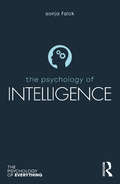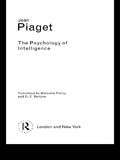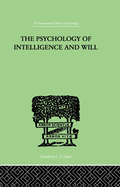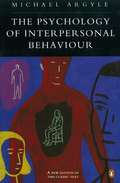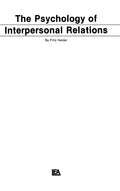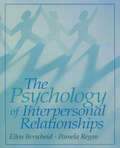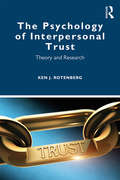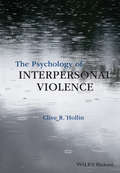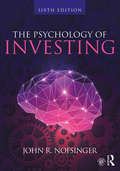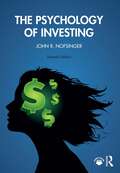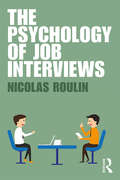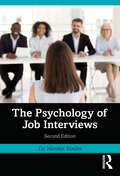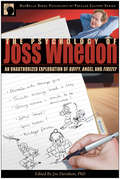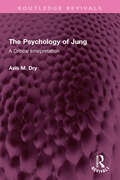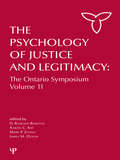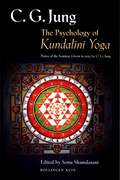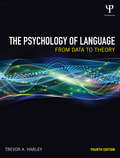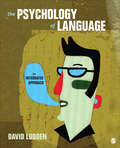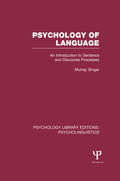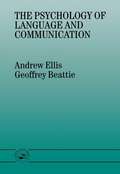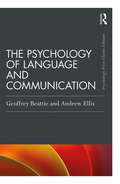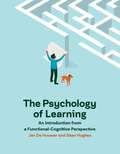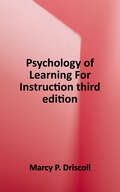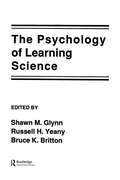- Table View
- List View
The Psychology of Intelligence (The Psychology of Everything)
by Sonja FalckWhat fascinates us about intelligence? How does intelligence impact our daily lives? Why do we sometimes fear intelligence? Human intelligence is a vital resource, yet the study of it is pervaded by neglect and misconceptions. The Psychology of Intelligence helps make sense of the contradictory social attitudes and practices in relation to intelligence that we have seen over the decades, from the idea that it drove eugenicist policies and actions in the past, to our current backlash against "experts" and critical thinking. Showing how our approach to intelligence impacts our everyday lives in educational, occupational, medical, and legal settings, the book asks if it is possible to lift the taboo and move beyond the prejudices surrounding intelligence. Challenging popular assumptions, The Psychology of Intelligence encourages us to face intelligence in ourselves and others as an important fact of life that we can all benefit from embracing more openly.
The Psychology of Intelligence
by Jean PiagetThink of developmental psychology, and the name of Jean Piaget immediately springs to mind. His theory of learning lies at the very heart of the modern understanding of the human learning process, and he is celebrated as the founding father of child psychology. A prolific writer, is the author of more than fifty books and several hundred articles. The Psychology of Intelligence is one of his most important works. Containing a complete synthesis of his thoughts on the mechanisms of intellectual development, it is an extraordinary volume by an extraordinary writer. Given his significance, it is hardly surprising that Psychology Today pronounced Piaget the Best Psychologist of the twentieth century.
The Psychology Of Intelligence And Will
by Wyatt, H GFirst Published in 1999. Routledge is an imprint of Taylor & Francis, an informa company.
The Psychology of Interpersonal Behaviour
by Michael ArgyleThe first edition of this book outlined what amounted to a breakthrough in the analysis of social behaviour. Since then it has become widely used as an introductory textbook of social psychology. It is invaluable to anyone interested in the subject or whose work involves dealing with people, as well as anyone who wants to know how to make friends and influence people. For this new, fifth edition, Michael Argyle includes the latest research on non-verbal communication, social skills and happiness.
The Psychology of Interpersonal Relations
by F. HeiderPublished in the year 1982, The Psychology of Interpersonal Relations is a valuable contribution to the field of Social Psychology.
The Psychology of Interpersonal Relationships
by Ellen S. Berscheid Pamela C. ReganThis textbook provides an integrated and organized foundation for students seeking a brief but comprehensive introduction to the field of relationship science. It emphasizes the relationship field's intellectual themes, roots, and milestones; discusses its key constructs and their conceptualizations; describes its methodologies and classic studies; and, most important, presents the theories that have guided relationship scholars and produced the field's major research themes.
The Psychology of Interpersonal Trust: Theory and Research
by Ken J. RotenbergTrust is a crucial facet of social functioning that feeds into our relationships with individuals, groups, and organizations. The Psychology of Interpersonal Trust: Theory and Research examines existing theories, frameworks, and models of trust as well as the methods and designs for examining it. To fully examine how interpersonal trust impacts our lives, Rotenberg reviews the many essential topics trust relates to, including close relationships, trust games, behavioural trust, and trust development. Designed to encourage researchers to recognize the links between different approaches to trust, this book begins with an overview of the different approaches to interpersonal trust and a description of the methods used to investigate it. Following on from this, each chapter introduces a new subtopic or context, including lying, adjustment, socialization, social media, politics, and health. Each subtopic begins with a short monologue (to provide a personal perspective) and covers basic theory and research. Rotenberg’s applied focus demonstrates the relevance of interpersonal trust and highlights the issues and problems people face in contemporary society. This is essential reading for students, researchers, and academics in social psychology, especially those with a specific interest in the concept of trust.
The Psychology of Interpersonal Violence
by Clive R. HollinThe Psychology of Interpersonal Violence is a textbook which gives comprehensive coverage of interpersonal violence - exploring the various violent acts that occur between individuals in contemporary society. Examines in detail the controversial use of corporal punishment Explores ways that psychology can add to our understanding of interpersonal violence Offers directions for future research that can help to prevent or reduce incidents of interpersonal violence
The Psychology of Investing
by John R. NofsingerWhile traditional finance focuses on the tools used to optimize return and minimize risk, this book explains how psychology can affect our decisions more than financial theory. Covering the ways investors actually behave, this is the first book of its kind to delve into the ways biases influence investment behavior, and how overcoming these biases can increase financial success. Now in its sixth edition, this classic text features: An easy-to-understand structure, illustrating psychological biases as everyday behavior; analyzing their effect on investment decisions; and concluding with academic studies that exhibit real-life investors making choices that hurt their wealth. A new chapter on the biology of investment, exploring the latest research on genetics, neuroscience, and how hormones, aging, and nature versus nurture inform our investment behavior. An additional strategy for controlling biases, helping readers understand the psychology that motivates markets and how to address it. Experiential examples, chapter summaries, and end-of-chapter discussion questions to help readers test their practical understanding. Fully updated with the latest research in the field, The Psychology of Investing will prove fascinating and educational for advanced students in investment, portfolio management, and behavioral finance classes as well as investors and financial planners.
The Psychology of Investing
by John R. NofsingerWhile traditional finance focuses on the tools used to optimize return and minimize risk, this book shows how psychology can explain our decisions more than financial theory. Analyzing how investors behave in the real world, this is the first book of its kind to delve into the ways biases influence investment behavior, and how overcoming these biases can increase financial success. Now in its seventh edition, this classic text features: An easy-to-understand structure, illustrating psychological biases as everyday behavior; analyzing their effect on investment decisions; and concluding with academic studies that show real-life investors making choices that hurt their wealth New content on fintech and cryptocurrencies, the role of social media in investing, generational biases, and the COVID-19 pandemic Experiential examples, chapter summaries, and end-of-chapter discussion questions to help readers test their practical understanding Online supplements comprising PowerPoint slides for both students and lecturers Fully updated with the latest research in the field, The Psychology of Investing will prove fascinating and educational for advanced students in behavioral finance, investment and portfolio management classes, as well as investors and financial planners.
The Psychology of Job Interviews
by Nicolas RoulinMost people, at some point in their lives, experience the stress of being interviewed for a job they want. Many also face the challenge of interviewing other people. But what does the science tell us about this unique social situation? What biases are involved, and how can we become aware of them? And how can job interviews be structured so that they are fair and effective? The Psychology of Job Interviews is the first book to provide an accessible and concise overview of what we know. Based on empirical research rather than second hand advice, it discusses the strategies and tactics that both applicants and interviewers can use to make their interviews more successful; from how to make a good first impression to how to decide which candidate is the best fit for the role. Illustrated with examples throughout, the book guides job applicants on how best to prepare for and perform in an interview, and provides managers with best-practice advice in selecting the right candidate. Debunking several popular myths along the way, this is essential reading for anyone interested in understanding what is really happening in a job interview, whichever side of the desk you are sitting.
The Psychology of Job Interviews
by Nicolas RoulinMost people, at some point in their lives, experience the stress of being interviewed for a job. Many also face the task of interviewing other people. But what does the science tell us about this unique social situation? What biases are involved, and how can we become aware of them? And how can job interviews be structured so that they are fair and effective? This second edition of The Psychology of Job Interviews provides an accessible and concise overview of what we know. Based on empirical research rather than secondhand advice, it discusses the strategies and tactics that both applicants and interviewers can use to make their interviews more successful; from how to make a good first impression to how to decide which candidate is the best fit for the role. Updated throughout, this timely new edition comes with an additional chapter focused on technology in interviewing. Also featuring the addition of a new "Toolbox" at the end of chapters with practical summaries, tools, advice, and concrete examples, the book guides job applicants on how best to prepare for and perform in an interview and provides managers with best-practice advice in selecting the right candidate. Debunking several popular myths along the way, this is essential reading for anyone interested in understanding what is really happening in a job interview, whichever side of the desk you are sitting.
The Psychology of Joss Whedon: An Unauthorized Exploration of Buffy, Angel, and Firefly
by Leah Wilson Joy DavidsonFirst there was "Buffy the Vampire Slayer"; then its spin-off "Angel"; then the cult hit "Firefly"; and its follow-up film, "Serenity." They all had two things in common: their creator, Joss Whedon ... and their surprising psychological depth.Revisit the worlds of Joss Whedon ... with trained psychologists at your side. What are the psychological effects of constantly fighting for your life? Why is neuroscience the Whedonverse's most terrifying villain? How can watching Joss's shows help you take on your own psychological issues?It's all the best parts of Psych 101--without Professor Walsh.* Robert Kurzban explains how Mal's morals are a form of evolutionary pornography, and why we like to watch* Thomas Flamson explores free will in the Whedonverse--with prophecies, sacred duties and the long arm of the Alliance, does anyone actually have any?* Carole Poole demonstrates how Buffy and Spike's season six relationship could be considered metaphor for narcissistic personality disorder--and concludes that Buffy may have been better off continuing it* Bradley J. Daniels looks at River's Alliance-altered brain, and the real effects of "stripping" the amygdala* Mikhail Lyubansky shows why, psychologically, death really is Buffy's gift* And editor Joy Davidson takes on Angel's mommy issues--how the course of his whole extraordinary existence can be traced back to the woman who made him a vampire
The Psychology of Jung: A Critical Interpretation (Psychology Revivals)
by Avis M. DryFirst published in 1961 The Psychology of Jung presents a critical and historical interpretation of Carl Jung’s psychology. In this book the author describes himself as an ‘independent student’ and as an ‘interested, though uncommitted observer’ and attempts to explain and reconcile drawbacks, contradictions, discrepancies and incongruities of Jungian theory, in particular, its indefiniteness, its mystical, semireligious characteristics, its emphasis on visual imagery and mythological symbolisms. It brings themes like historical background; early and intermediate period; the Jungian therapy and related insights; Jung’s critique of Freud and Psychotherapy; changes in Jung’s work and its appeal; and Jungian psychology and its appeal. This is a must read for students of psychoanalysis and psychology.
The Psychology of Justice and Legitimacy (Ontario Symposia on Personality and Social Psychology Series)
by James M. Olson Mark P. Zanna D. Ramona Bobocel Aaron C. KayIn response to the international turmoil, violence, and increasing ideological polarization, social psychological interest in the topics of legitimacy and social justice has blossomed considerably. Social psychologists have explored the psychological underpinnings of people’s reactions to injustice and illegitimacy, including the behavioral and psychological consequences of the motivation to view individual outcomes and governmental systems as just and legitimate. Although injustice and illegitimacy are clearly related at conceptual and theoretical levels, these two rich literatures are rarely integrated. Social justice researchers have focused on how people make sense of particular instances of injustice, whereas legitimacy researchers have tended to focus primarily on people’s reactions to unfair systems of intergroup relations. This 11th volume of the Ontario Symposium series brings together the work of leading researchers in fields of social justice and legitimacy to facilitate the cross-pollination and integration of these fields. The contributions address broad theoretical issues and cutting-edge empirical advances, while illustrating the diversity and richness of research in the two fields. By uniting these two domains, this volume will stimulate new directions in theory and research that seek to explain how and why people make sense of injustice at all levels of analysis.
The Psychology of Kundalini Yoga: Notes of the Seminar Given in 1932 (Jung Extracts #26)
by C. G. Jung"Kundalini yoga presented Jung with a model of something that was almost completely lacking in Western psychology--an account of the development phases of higher consciousness.... Jung's insistence on the psychogenic and symbolic significance of such states is even more timely now than then. As R. D. Laing stated... 'It was Jung who broke the ground here, but few followed him.'"--From the introduction by Sonu Shamdasani Jung's seminar on Kundalini yoga, presented to the Psychological Club in Zurich in 1932, has been widely regarded as a milestone in the psychological understanding of Eastern thought and of the symbolic transformations of inner experience. Kundalini yoga presented Jung with a model for the developmental phases of higher consciousness, and he interpreted its symbols in terms of the process of individuation. With sensitivity toward a new generation's interest in alternative religions and psychological exploration, Sonu Shamdasani has brought together the lectures and discussions from this seminar. In this volume, he re-creates for today's reader the fascination with which many intellectuals of prewar Europe regarded Eastern spirituality as they discovered more and more of its resources, from yoga to tantric texts. Reconstructing this seminar through new documentation, Shamdasani explains, in his introduction, why Jung thought that the comprehension of Eastern thought was essential if Western psychology was to develop. He goes on to orient today's audience toward an appreciation of some of the questions that stirred the minds of Jung and his seminar group: What is the relation between Eastern schools of liberation and Western psychotherapy? What connection is there between esoteric religious traditions and spontaneous individual experience? What light do the symbols of Kundalini yoga shed on conditions diagnosed as psychotic? Not only were these questions important to analysts in the 1930s but, as Shamdasani stresses, they continue to have psychological relevance for readers on the threshold of the twenty-first century. This volume also offers newly translated material from Jung's German language seminars, a seminar by the indologist Wilhelm Hauer presented in conjunction with that of Jung, illustrations of the cakras, and Sir John Woodroffe's classic translation of the tantric text, the Sat-cakra Nirupana. ?
The Psychology of Language
by Trevor A. HarleyNow in full colour, this fully revised edition of the best-selling textbook provides an up-to-date and comprehensive introduction to the psychology of language for undergraduates, postgraduates, and researchers. It contains everything the student needs to know about how we acquire, understand, produce, and store language. Whilst maintaining both the structure of the previous editions and the emphasis on cognitive processing, this fourth edition has been thoroughly updated to include: the latest research, including recent results from the fast-moving field of brain imaging and studies updated coverage of key ideas and models an expanded glossary more real-life examples and illustrations. The Psychology of Language, Fourth Edition is praised for describing complex ideas in a clear and approachable style, and assumes no prior knowledge other than a grounding in the basic concepts of cognitive psychology. It will be essential reading for advanced undergraduate and graduate students of cognition, psycholinguistics, or the psychology of language. It will also be useful for those on speech and language therapy courses. The book is supported by a companion website featuring a range of helpful supplementary resources for both students and lecturers.
The Psychology of Language: An Integrated Approach
by David C. LuddenBreaking through the boundaries of traditional psycholinguistics texts, The Psychology of Language: An Integrated Approach, by David Ludden, takes an integrated, cross-cultural approach that weaves the latest developmental and neuroscience research into every chapter. Separate chapters on bilingualism and sign language and integrated coverage of the social aspects of language acquisition and language use provide a breadth of coverage not found in other texts. In addition, rich pedagogy in every chapter and an engaging conversational writing style help students understand the connections between core psycholinguistic material and findings from across the psychological sciences.
The Psychology of Language: An Integrated Approach
by David C. LuddenBreaking through the boundaries of traditional psycholinguistics texts, The Psychology of Language: An Integrated Approach, by David Ludden, takes an integrated, cross-cultural approach that weaves the latest developmental and neuroscience research into every chapter. Separate chapters on bilingualism and sign language and integrated coverage of the social aspects of language acquisition and language use provide a breadth of coverage not found in other texts. In addition, rich pedagogy in every chapter and an engaging conversational writing style help students understand the connections between core psycholinguistic material and findings from across the psychological sciences.
Psychology of Language: An Introduction to Sentence and Discourse Processes (Psychology Library Editions: Psycholinguistics)
by Murray SingerOriginally published in 1990, this comprehensive volume addresses the central issues of sentence and discourse processes, with particular emphasis placed on reading and listening comprehension. The text material is accessible to both upper-level undergraduate and graduate students and informative for professionals and educators. In this regard, this uncommon volume identifies the logic of both the specific experimental manipulations that are described, and the more general on-line and memory measures frequently invoked. The principles presented in the text are supported by hundreds of numbered and unnumbered examples, and by precise tables and figures.
The Psychology of Language And Communication (Psychology Press And Routledge Classic Editions Ser.)
by Geoffrey Beattie Andrew EllisThis wide-ranging introduction to the psychology of human language use offers a new breadth of approach by breaching conventional disciplinary boundaries with examples and perspectives drawn from many subdisciplines - cognitive and social psychology, psycholinguistics, neuropsychology and sociology. After an exploration of the diverse nature of communication, using examples throughout the animal kingdom, the authors focus on the range of human communicative channels, the nature of human language and the variations occurring between and within societies and cultures. Subsequent chapters cover speech production as a psycholinguistic skill; the coordination of verbal and non-verbal channels; the structure and management of conversations; language perception and comprehension; the cognitive neuropsychology of language, and the development of communicative skills. The book also presents an informative and entertaining historical perspective, and illustrates the fact that insights gained into controversial problems in other fields and at other times can shed light on many of today's most contentious debates in psychology.
The Psychology of Language and Communication (Psychology Press & Routledge Classic Editions)
by Geoffrey Beattie Andrew W EllisThis is a classic edition of Geoffrey Beattie’s and Andrew Ellis’ influential introduction to the psychology of human language and communication, now including a new reflective introduction from the authors. Drawing on elements from many sub-disciplines, including cognitive and social psychology, psycholinguistics and neuropsychology, the book offers an approach which breaches conventional disciplinary boundaries. Exploring the diverse nature of communication, Beattie and Ellis focus on the range of human communicative channels and the variations which occur both between and within societies and cultures. Written from an informative and entertaining historical perspective, The Psychology of Language and Communication remains a key resource for anyone interested in the psychology of communication, language and linguistics, 30 years on from its first publication.
The Psychology of Learning: An Introduction from a Functional-Cognitive Perspective
by Jan De Houwer Sean HughesAn introduction to the psychology of learning that summarizes and integrates findings from both functional psychology and cognitive psychology.Learning unites all living creatures, from simple microbes to complex human beings. But what is learning? And how does it work? For over a century, psychologists have considered such questions. Behavior analysts examined the ways in which the environment shapes behavior, whereas cognitive scientists have sought to understand the mental processes that enable us to learn. This book offers an introduction to the psychology of learning that draws on the key findings and major insights from both functional (behavior analysis) and cognitive approaches.
Psychology of Learning for Instruction
by Marcy P. DriscollThe Third Edition of this popular text continues its in-depth, practical coverage with a focus on learning and instruction that presents the latest psychological and educational models and research to the students of today's learning society. <p><p>This book focuses on the applications and implications of the learning theories. Using excellent examples ranging from primary school instruction to corporate training, this text combines the latest thinking and research to give students the opportunity to explore the individual theories as viewed by the experts. Students are encouraged to apply "reflective practice," which is designed to foster a critical and reflective mode of thinking when considering any particular approach to learning and instruction.
The Psychology of Learning Science
by Bruce K. Britton Shawn M. Glynn Russell H. YeanyFocusing on the teaching and learning of science concepts at the elementary and high school levels, this volume bridges the gap between state-of-the-art research and classroom practice in science education. The contributors -- science educators, cognitive scientists, and psychologists -- draw clear connections between theory, research, and instructional application, with the ultimate goal of improving science teachers' effectiveness in the classroom. Toward this end, explicit models, illustrations, and examples drawn from actual science classes are included.
